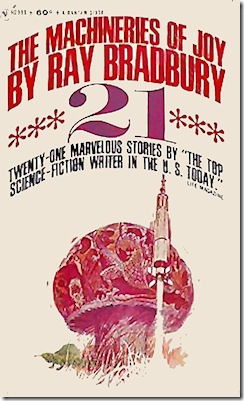 The Machineries of Joy is the 8th Bradbury book that I’ve read this month. I have handed out five Bradbury books to friends and I have received nothing in return. I hope at least one of my readers is actually reading Bradbury along with me. I have only a few more days of reading left in October and I expect that I will have read 11 or 12 Bradbury books by Halloween.
The Machineries of Joy is the 8th Bradbury book that I’ve read this month. I have handed out five Bradbury books to friends and I have received nothing in return. I hope at least one of my readers is actually reading Bradbury along with me. I have only a few more days of reading left in October and I expect that I will have read 11 or 12 Bradbury books by Halloween.
The Machineries of Joy was published in 1964 and most of the stories date from the early 1960s. Bradbury’s writing is deeper, more philosophical and more complex. The simple image based stories have been replaced with complicated idea based stories. This is perhaps one of the last great collections by Bradbury. After Machineries of Joy comes I sing the Body Electric in 1969, which I will read soon. After that, Bradbury’s output is more predictable and nostalgic. He revisits themes and makes new collections of old stories, but never reaches these heights again.
I bought Machineries of Joy when I was either 14 or 15. I can tell because it has the clear plastic covering that put on my "regular books". I never went anywhere without a book in back pocket. I bought a roll of clear con-tact and covered about 20 books. I chose my favorites like Tolkien, Heinlein and Bradbury.
I think my favorite story is A Miracle of Rare Device. The title comes from a line from Coleridge’s Kubla Khan. A couple of near-do-well drifters discover a mirage in the Arizona Desert, put up a fence and charge admission to see it. The mirage disappears when a competitor cheats them out of their cash cow. It turns out that you have to believe in the miracle to be able to see it. It must have been a difficult story to write, yet Bradbury pulls us through with interesting characters, an interesting plot and a very satisfying ending. I like to think that I could have written some of the early Bradbury stories, but Miracle is so far into the rarefied realm of genius that all I can do is read it with awe.
Not all the stories are that good. Some, I felt, Bradbury knocked off in one hung over session, but most of these are great stories, if not as accessible as some of his earlier works. Ray seems intent on making us think out way through the idea before he gives us his wonderful emotional kick in the butt.